Jocelyne LaGarde @100: "Hawaii"
 Wednesday, April 24, 2024 at 9:00PM
Wednesday, April 24, 2024 at 9:00PM 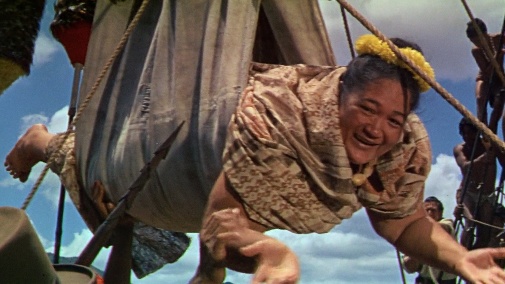
This year, there was much talk about Lily Gladstone as one of the few Native Americans ever nominated at the Oscars. This focus on indigenous representation makes one's mind wander further into Academy history. After all, who was the first? Jocelyne LaGarde was her name, and today marks a century since her birth. The film that earned such honor was one of those 1960s overblown epics, the historical farrago of Hawaii by George Roy Hill, whose future work would stray away from such stodginess. Yet, to dismiss the piece as colonial apologia like some of its harsher critics do is unjust. The picture's much stranger than that, cruel and miserable, willing to see missionary work as the destroyer of paradise, a tragedy marred by the kind of spiritual bleakness no luscious island vista can conceal…
Adapted from James A. Mirchener's novel of the same name, Hawaii is set in the 1820s, when Prince Keoki Kanakoa invites Christian missionaries to the Pacific Islands he once called home. Following his call, young Reverend Abner Hale hastily marries a fellow clergyman's daughter, Jerusha, and sets sail to Hawaii. In one of his first Hollywood projects, Max von Sydow plays the Reverend like a surrender to Christian arrogance, intoxicated by his own righteousness to the point of moral myopia, if not rot. From outlandish sneezes to grimaces carved into an aged visage, the Bergman veteran complicates the script's attempts at redemption, though that approach rarely results in engaging drama.
Julie Andrews is a bizarre duet partner, playing Jerusha like a character transplanted from a different film. One where beatific platitudes have real value, and godly sincerity is enough to bend the fabric of reality. If von Sydow excavates a good man's spiritual faults, his interior ugliness and bitterness exposed, Andrews opts for surface-level niceties. That works well sometimes but often rings a discordant note within the story's symphony. For example, she never entirely solves the matter of Jerusha's extra-marital infatuation with Captain Rafer Hoxworth, some brusque whaler played by a mercurial Richard Harris. For his part, the Irish actor never seems comfortable with Hill's idea of embalmed history.
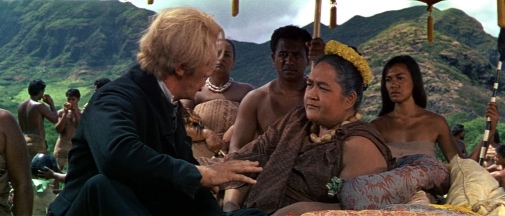
The cast's alchemy is further complicated by such presences as Gene Hackman and a debuting Bette Midler, as well as a vast cadre of indigenous actors that come into play once the Reverend reaches Hawaii. Most Polynesian performers had no experience in front of cameras, as was the case of Jocelyne LaGarde, who was chosen to play the pivotal role of Malama, ruler of her people. Hired for her physical appearance rather than acting skill, the novice thespian couldn't speak her character's idioms of English and Hawaiian, knowing French and Tahitian instead. As consequence, her lines were fed to her phonetically, and the whole performance suffers from many of the issues that plague such nonprofessionals first forays into film.
At the same time, it's difficult to deny LaGrande's impact in the context of Hawaii. There's a fair amount of exploitative exoticism to how the camera regards her, but that approach also results in powerful imagery that pierces through the staged rigidity of the white characters. Moreover, while her delivery is stilted, it also strikes the viewer as more natural than whatever the experienced pros are doing. It's a shot of real life transcending the Hollywood apparatus, similar to what happened in the Italian Neorealist experiments decades prior. Whatever alienation one might read in her register can also be folded into the characterization, feature rather than fault.
Malama is the Ali'I Nui and a sacred person to her subjects, someone whose very being is enshrined in a sense of holiness. For the missionaries, she's a monstrous mystery at worst, a childish noble savage at best. The incestuous customs of the Hawaiian royalty scandalize most of their white invaders, confounding those charitable enough to look past their prejudice. And yet, she barrels through their nonsense and mostly keeps her dignity and authority. Consider how she instantly takes a liking to Jerusha and commands her to be a teacher, disregarding the other woman's autonomy because, as queen and sanctity, her will is divine and absolute. LaGarde plays the moment with no malice, merely a hint of inflexibility and a good deal of cheery warmth.
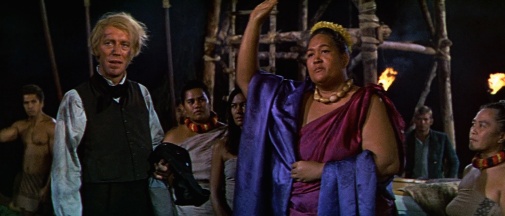
When considering the fate of a birthmarked babe, LaGarde throws the lines so off-handedly that it's like watching someone repudiate the colonial eye implicit in the material. There's no underlining of the moment's sensationalism nor an acknowledgment of strong emotion. These things are just a matter of fact, everyday life in the queen's kingdom, no matter how Hawaii might otherwise frame them. Later, she will deny misreadings of Malama as a naïf, playing strategy as second nature, and sorrow as a great interior pain. Christianity is not so much her soul’s salvation as an idea that corrodes her from the inside out, blossoming shame and disappointment over her open expression. Her deathbed baptism is the culmination of it all, and, for a brief moment in time, Hawaii finds a purpose, perhaps even grace.
Though othered by the script and general design, Malama becomes the most complex figure in her film thanks to Jocelyne LaGarde’s presence, her unbending dignity.
The queen is also the person whose gaze is most multifaceted in a story of religious conflict and the erosion of Native Hawaiian culture. Indeed, from her first scene, she's as fascinated by the white people as they are by her. But is the buzz of inquisitiveness running through Malama a considered acting choice or the trepidation of an amateur experiencing moviemaking for the first time? Does it matter beyond concerns of fair labor and basic respect? What ends up on the screen works, so that should be it. All I know is that, by the end of Hawaii, Malama's tale is the sole narrative threat that holds staying power. Her fate is the only one that matters and whose losses sting the viewer. She's unpolished yet raw and affecting.
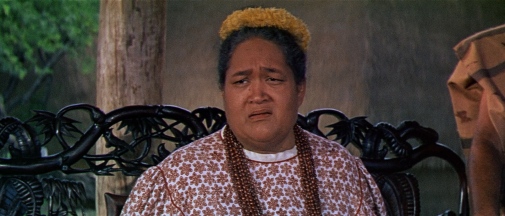
But of course, recognizing a performance's value doesn't necessarily mean one cosigns the many honors it accrued - I can't say I'd nominate her. Also, to this day, LaGarde is the one actor to have scored an Oscar nomination for the only project they ever made. She won the Golden Globe in an upset against Sandy Dennis in Who's Afraid of Virginia Woolf?, though, in the end, the latter took Hollywood's most coveted trophy. None of that resulted in more movement in the movie industry or even acting as a whole. Not that LaGarde's health would allow much more. A few years after her breakthrough, she was struggling with complications from diabetes and even traveled to Hawaii to receive treatment. She died in 1979 at the age of 55, leaving behind her work as an epic's saving grace and a couple of important Oscar records to go along with it.
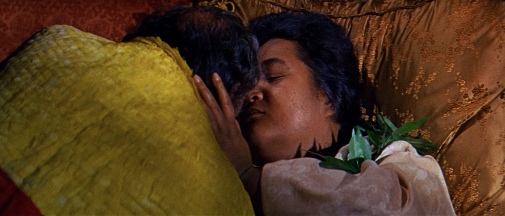
Hawaii is currently streaming on Amazon Prime Video and Tubi. You can also rent and purchase it on Apple TV.



Reader Comments (7)
In 1966, we went to Hawai’i to see Julie Andrews. We stayed for Jocelyn LeGarde.
The article fails to mention which version of the film you watched. The roadshow presentation is 28 minutes longer than the edit used for general release. Based on your comments, I assume you saw the abbreviated cut. Though Andrews was top billed, most of the deleted 28 minutes were scenes that gave substance and meaning to Jerusha Bromley Hale. I think Andrews is marvelous in her complete performance. The edited one suffers by comparison.
Acknowledging that memory is often colored by time, I recall how LeGarde captured the public’s favor when Hawai’i was released. Her physicality, intonation and delightful humor won over audiences. More than pretty cinematography, movie goers flocked to see Aliʻi Nui. There was an authenticity to the character that went beyond the script. I remember being surprised when she lost the Oscar to Sandy Dennis.
Wow! A beautifully written look at a fascinating, albeit obscure, Hollywood story. This is the good stuff. Thanks, Claudio.
Hawaii is a very underrated movie that makes a big fat target for Hollywood blockbuster haters. It has a lot of the problems that only money can buy - they seem hell-bent on spending every last dollar of the budget, whether they need to or not, but still the story is gripping, the score and cinematography are outstanding, and how many Hollywood blockbusters feature the Christians as the villains? This is even made clearer in the excellent sequel The Hawaiians (1970). The film would be worth it alone for Max Von Sydow's extraordinary performance as the mule-headed religious fanatic protagonist, and how he illuminates him and makes him a three-dimensional character, not just a villain.
And Jocelyn LaGarde is sublime. Her warmth and kindness make her the perfect dream of a mother figure (similar to Hattie McDaniel in Gone with the Wind), making her tragedy all that much more profound. She definitely deserved the Oscar that year. The only other nominee in her league is Vivien Merchant in Alfie. My top Supporting Actress of 1966, however, would be Lola Albright in Lord Love a Duck, a film the Academy wasn't going to touch with a ten-foot pole (Tuesday Weld is also outstanding in it). Other than Charlotte Rampling in Georgy Girl, I can't think of any other actresses offhand in my top tier that year.
Back in 2008, when I had a blog, I was invited to talk about this performance as part of one of the Supporting Actress Smackdowns (during the StinkyLulu era of those events). This was the conclusion I reached then, and I wouldn't say anything different today:
"It's an impossible performance to evaluate in conventional terms. LaGarde, a French-speaking Tahitian, spoke neither English nor Hawaiian, and learned all of her lines phonetically. When you're doing nothing but reciting strings of nonsense syllables, there is no room for spontaneity, creativity, discovery of something unexpected in the moment. There is, in short, no room for acting.
"LaGarde's performance is an elaborate stunt which turns her into a cross between a life-sized prop and a trained parrot. I admire the relative grace with which the stunt is performed, but it would be both unkind and unfair to compare what LaGarde is doing with real acting."
Sanford Meisner famously noted, “Acting is behaving truthfully under imaginary circumstances.”
In 1948, honorary Oscar winner Ivan Jandl appeared in The Search. The Czechoslovakian child actor played an Auschwitz survivor searching for his mother in post war Germany. He spoke no English and learned his lines phonetically. Viewers would be hard pressed to dismiss the effect of this actor's work.
For Best Picture nominee Avatar, linguist Paul Frommer devised the Na'vi language especially for the film.
For Best Picture nominated trilogy Lord of The Rings, director Peter Jackson included some scenes where actor speak Elvish. The production employed Tolkien "experts" to insure correct pronunciation.
Jocelyn LeGarde is far from unique. There is a long ling of recognized acting that was honored for its power beyond, or in spite of, language. LeGarde's performance in Hawaii is a fine example of an actor behaving truthfully in imaginary circumstances.
I haven't seen the film/performance, but just want to add that there is no such thing as "correct" art or a right/wrong approach to anything, especially creativity. No matter how unconventional the circumstances, it doesn't make it any less "real acting" than traditional approaches. In another reality, learning lines phonetically and acting in another language is the norm and what we consider "normal" is not.
And that's what's fun about art! Now, the "success" of various approaches to the craft is totally subjective to the viewer as well... And that's part of the fun too!
Hi, Cláudio. Congratulations on this article. I'm a big fan. I also wrote a brief publication about Jocelyne LaGarde. But I strongly recommended YOUR article to those of my readers who understand English, and included the link to yours,
https://www.instagram.com/p/C6PGjrUr2ny/